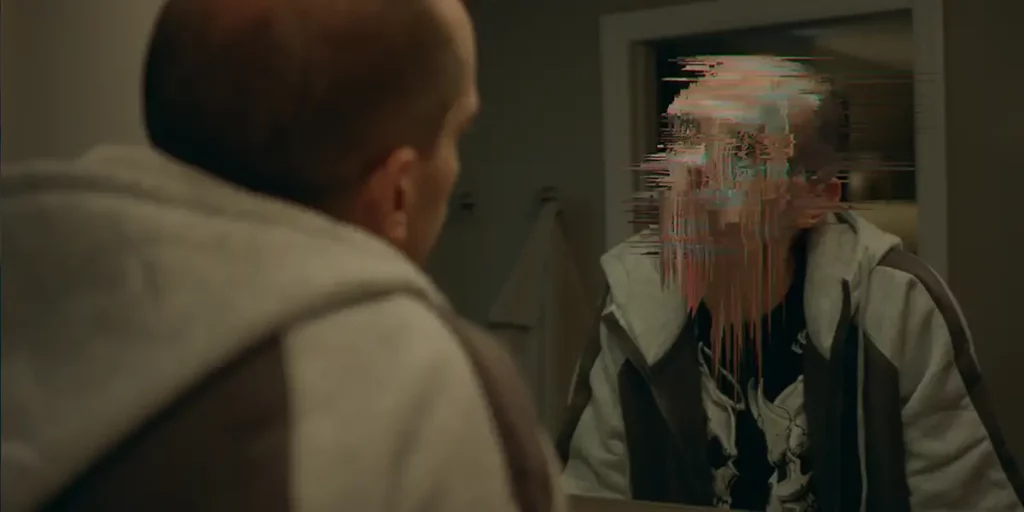Colin Archdeacon’s true crime series CTRL+ALT+Desire is stylish and intriguing, but buckles somewhat under an infuriating subject.
The world of true crime is a vast and fascinating one. There are innumerable podcasts, series, films, articles, books and YouTube creators dedicated to telling stories about some of the world’s worst criminals. CTRL+ALT+Desire, Colin Archdeacon’s series dedicated to the case of Grant Armato, is very much a product of this cultural obsession, stemming from a four-year investigation into the Florida-native’s conviction for murdering his entire family.
A small town community in the Sunshine State is rocked when Armato’s mother, father and brother are found shot to death in their home. When Armato was arrested and interviewed by police, what unfolded was a story of a man so obsessed with a Bulgarian cam-girl named Silvie that he spiralled into depression, financial ruin and dangerous isolation.
CTRL+ALT+Desire is predominantly a vehicle for the multitude of phone conversations Archdeacon had with Armato to be pieced together into a coherent retelling of the case from Armato’s perspective. Talking head interviews with reporters, detectives and Armato’s defence team round out the narration, which is in turn overlaid over a series of selfies, online footage, police interviews, and brief interludes of reconstructions from actors.
This series format, as opposed to a filmic one, allows Archdeacon to indulge in the set-up, offering a lot more context and background information for the audience to be privy to. It also gives Armato the opportunity to be, seemingly, candid and honest about how streaming video games on Twitch to make some money devolved into spending thousands of dollars a day on gifts for Silvie. It is interesting, well-paced and intriguing, delving into the cycle of mental health struggles and the checklist of internet dangers.
But crucially, where the series stumbles is that, as a subject, Armato is neither a particularly interesting nor convincing one. He’s abrasive, awkward, evasive and contradictory. His online persona was, in his own words, a “digital representation” of what he aspired to be. But because it became such an obsession, something so all-consuming that it led to unspeakable tragedy, it’s hard to feel like he isn’t still putting on a performance. And while Archdeacon is certainly not looking to glorify Armato’s choices, actions or behaviours, it does feel like the series is giving him exactly what he grew so addicted to: a modicum of attention and infamy, however slight.
Armato feels disingenuous to a frustrating degree. His language choices are so bizarre – he describes a moment of confrontation as a “cataclysmic episode” but his subsequent actions as coming from a place of “compassion” – and he offers so little emotive range in his storytelling, that it’s hard to understand what captivated Archdeacon in the first place. CTRL+ALT+Desire is so clearly the product of intense effort and dedication, but Armato is so off-putting and infuriating that the emotional crux of the series, the moment Archdeacon has built-up and telegraphed to the nth degree, simply doesn’t have the impact it should have.

Archdeacon tries to come at Armato’s case from various angles, offering audiences a lot of interesting threads to consider. The first episode focuses on Armato’s upbringing, his career struggles, familial relationships and mental health issues, as well as the escapism he found in the online sex industry. The second is predominantly centred around the trial and subsequent media coverage, eschewing the grisly details of the crime in an admirable effort to avoid the sensationalism that often accompanies the true crime genre.
But then the finale undoes a lot of that hard work. It upends the image Armato has consistently tried to project over the past two, one even Archdeacon seemingly bought in to. It flirts with and then abandons the issue of sexism in regards to the media’s coverage of Silvie, only briefly touching on the intricacies of the world of cam-modelling and the ‘relationships’ these women have with their audiences. And it also briefly mentions the internet’s obsession with cases like Armato’s, but doesn’t offer any meaningful discussion or input from those involved in the videos, podcasts and discussion boards that dominate that internet space. It feels like it disregards the opportunity being a series provides, which is that room to explore the intricacies outside of the simple facts of the case necessarily in a more concise film setting.
And so, unfortunately, it means that what, for the most part, is a compelling, interesting and well put-together series ends on its weakest note. CTRL+ALT+Desire is very slickly edited, and features a lot of interesting and flashy visuals that act as representations of the digital space, but it doesn’t stand out from a lot of other series’ of its ilk. While it’s certainly something for fans of the genre to enjoy, it perhaps won’t elicit any particularly stand-out reactions from those who aren’t.
CTRL+ALT+Desire will be available to stream on Paramount+ from April 16, 2024.

